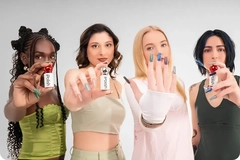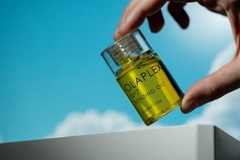“AI allows deeper learning, faster”: Unilever explores human microbiome to develop beauty NPD
 According to Dr. Samaras (pictured), Unilever is utilizing science and data in a way that “could never be used before.”
According to Dr. Samaras (pictured), Unilever is utilizing science and data in a way that “could never be used before.”17 Jul 2023 --- The sophistication of computer science and machine learning is helping Unilever make “what was once the impossible, possible.” That is according to Dr. Samantha Samaras, R&D head of Science and Technology for Beauty & Wellbeing and Personal Care.
Speaking to Personal Care Insights at a recent event in London, UK, Samaras explains how the company is advancing in the space of personal care with more knowledge than ever before on the human microbiome.
Unilever holds the world’s largest skin biome database. “We’ve been gathering data since 2003 when we ran our first clinical study, which was on the axilla [the underarm],” explains Samaras.
“The amount of data we have is three times that of The Human Microbiome Project, a US National Institutes of Health research initiative to improve understanding of the microbiota involved in human health and disease.”

“We have such a breadth of understanding of the skin, the scalp, the mouth and the gut, and how those systems actually connect. With our capabilities in big data and AI, our knowledge will continue to grow,” Samaras reflects.
.png) Unilever holds the world’s largest skin biome database.“There are two things we can do with AI,” she notes. “One is to learn things we couldn’t learn before and the other is automating and designing faster than we could before. So one appears to be about efficiency, but it is actually about robustness.”
Unilever holds the world’s largest skin biome database.“There are two things we can do with AI,” she notes. “One is to learn things we couldn’t learn before and the other is automating and designing faster than we could before. So one appears to be about efficiency, but it is actually about robustness.”
Condensing years of research into “45 minutes”
AI is not a new concept. Machine learning has been around since the 1950s, but Samaras divests that what has changed in relation to modern-day machine learning is the “sophistication of computer power,” which enables the ability to use much larger sets of data and the technology to gather that data has “changed dramatically.”
Samaras, a microbiologist, did her Ph.D. twenty years ago, focusing on cloning two genes that cause malaria. “It took me three years to understand those two genes, and now with the technology available, I can do that in around 45 minutes.”
For Samaras, this means that instead of exploring and cloning those genes, she could spend that time understanding them and ultimately learning more about malaria.
“Machine learning allows us to get to a level of deeper learning, much faster than we previously thought would be available.”
Feeling good from the inside out
One key area of development for Unilever is exploring how one’s holistic life affects beauty, appearance and overall well-being.
“I always think about the products we make as helping you put your psychological armor on every day. Consumers want to feel their best and comfortable in their skin, which is linked to improved mental health,” explains Samaras.
“And so, the products we developed made scientific technology not only help women feel more confident but measurably be more confident after using these products. It goes beyond a product just smelling good, there are lots of different parameters and processes to get to the end goal.”
“Understanding the science behind the technology and examining how remarkably complicated the human body can be can be very mechanical. So, when we’re developing a product for acne-prone skin or under eye circles, AI and big data can allow us to look into these trends much deeper and they can arm us with powerful knowledge in areas that could take much longer to understand,” she notes.
“For the instance of acne, in the old world of biology, we would intervene with one ingredient, for example, and for every six genes that would go up, another six genes might come down.”
Now with using AI, Samaras explains that “we can look at a thousand genes and find that it was gene 732 that changed just a minimal amount, which could be the thing we needed to go after.”
“These things can have huge measurable differences in robustness and time, but these small changes can then cause a significant change to the end product, and that’s the thing we need to go after.”
Samaras believes that in the next five to ten years, every sector in the medical world will be utilizing a theory called “the tipping point.”
“By understanding how interventions can happen, Unilever will see development in processes, innovation and so on, that wasn’t possible before,” she adds.
Samaras notes that the company can bring development forward by “eight or nine years” using AI and machine learning in some research areas. AI allows Unilever to examine trends deeper and arm scientists with knowledge in areas that previously would take much longer to understand, says Samaras.
AI allows Unilever to examine trends deeper and arm scientists with knowledge in areas that previously would take much longer to understand, says Samaras.
Mistakes are few and far between
Unilever has a materials innovation factory in Liverpool, UK, which uses robots.
Samaras says the robots can perform bespoke tasks, such as washing swatches of human hair, repeatedly and without mistakes, without burning out, making errors or getting bored.
“Shirley, the swatch-washing robot, measures the formulation of a shampoo or conditioner, for example, and not only can she perform this task faster, but she can also do it more robustly, 24 hours, 365 days a year.”
“We can test millions of combinations to get the right outcome. And by using AI, we can measure that in a way we couldn’t before,” Samaras explains.
With regard to consumer data, using the proprietary AI that Unilever has internally, scientists can combine all consumer data it has gathered with biological data and find out what is trending in certain countries and which ingredients consumers are interested in for that period.
Predicting biological responses
Samaras’ research team is harnessing AI to predict the skin’s specific biological processes when exposed to certain conditions.
“The skin is your largest organ,” she says. “It is the thing that helps you interact with the world. It’s a very dynamic organ with more cells than any other human organ.”
Understanding these biological responses with such precision was not achievable at this level previously.
“We can only look at it, you know, we’re looking at genetic responses or gene responses we can look at the top three that went up and the top three that went down and then sort of follow those through to the logical conclusion,” notes Samaras.
“It might be that a specific gene causes the cascade within the body and that’s the genius part that we never could find before. But now, using AI and computer power, we can unlock new ways of doing things that lead us to innovations.”
As part of Unilever’s research into the microbiome last July, scientists researched ways to stimulate the skin’s organic ceramide-producing mechanisms so that it can mend itself. It has partnered with IBM and Eagle Genomics to create modern approaches using AI to unearth new insights in microbiome datasets and provide treatments for dry skin.
In similar developments last month, Unilever and intelligent protein designer Arzeda developed new enzymes with increased stability, performance and sustainability benefits for cleaning and laundry products. The achievement is touted to be five times faster than previous enzyme development.
Meanwhile, in May 2022, Unilever acquired a majority stake in Nutrafol, a US-based holistic hair wellness brand. Nutrafol’s hair vitamin, mineral and supplements brand has a “multi-pronged approach which uses anti-inflammatories and adaptogens to try and target the different reasons why hair growth might be slowing down,” Samaras tells us.
By Elizabeth Green













